This article is more than 5 years old.
My first visit to Chicago was 40 years ago on an excursion with the University of Michigan-Flint History Club. I was a student in Ann Arbor but my friend talked them into taking me along. My friend and I often found ourselves referring to a tourist map trying to figure out the “L” and getting around the city. People would stop and ask if they could help us find something and I was impressed with their helpfulness. So in 2017 I was able to attend ALA and would occasionally find myself looking at a map on my phone to figure out where I was going. People stopped and asked me if they could help us find something. I’m still impressed. I love exploring big cities and Chicago is the BEST.
My conference started off on Friday at Library Con sponsored by Penguin Random House where I learned how to break into creating graphic novels from a panel of authors. (in case I decide I want a career change) At the time I had no idea that ZSR was looking into increasing our graphic novel holdings. These folks had found their nerd herd and it was fun to be there.
The opening session with outgoing president, Julie Todaro and Mayor Rahm Emanuel was predictably inspiring and then we were off to explore a couple of the receptions held by vendors.
Kanopy held a reception at the Art Institute which I attended in hopes of getting an update on any developments in video streaming and getting a look at the art but there was no information and very little art in the reception area. OCLC was holding their 50th Anniversary reception at the Adler Planetarium which is a beautiful building,
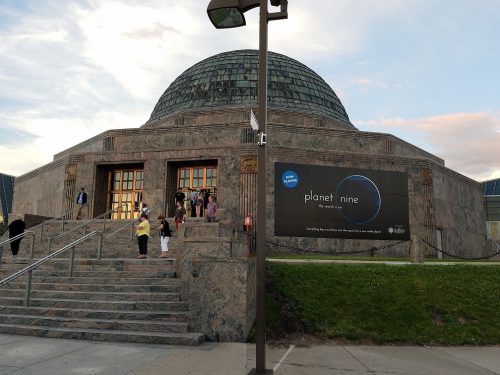
with a beautiful view,
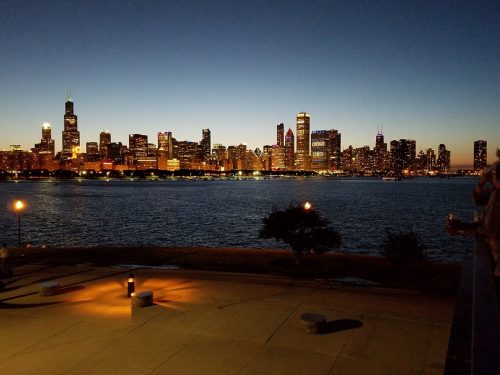
and some very cool stuff.
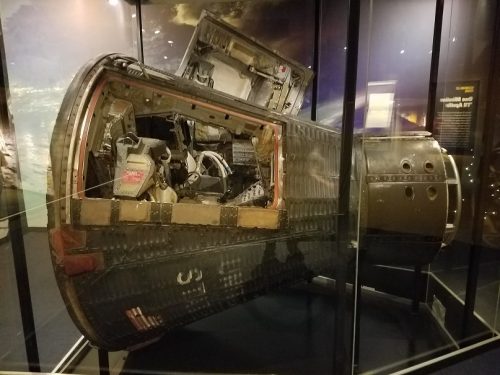
The next day I attended the Intellectual Freedom and Open Access: Working toward a common goal? session wanting to learn more about Open Access but it turned out to be an insightful program on systemic exclusion of marginalized peoples in publishing.
Some of the speakers’ points that I found interesting included:
- We need to look for systemic reasons for the clear divide between who has access to information and who is not enjoying intellectual freedom. Censorship is not censoring an individual but a system that does not accurately represent society. This is a place where open access can contribute.
- It is the right of every individual to access information without barriers. For-profit publishers have been publishing the same way for 350 years. They are trying to retain authoritative status and are subsidized by academics. What is needed is for open access to have authority. We say we value open access and then continue to value traditional publishers.
- We are on the wrong side of the digital divide when we can no longer afford to buy the content our people need. Since being published is valued in academia, create a repository of research and pay researchers in citation. The publisher would agree to promote your research in exchange for publishing with them.
- Change our values. 1. Encourage the disenfranchised to write. 2. Put pressure on publishers. 3. Change our values – what material do we promote? Look at our collections and ask, “Who’s missing?”
- Open access is not sustainable if only a few libraries do it. There is no more diversity in publishing (mainstream) than there was 25 years ago. Advocate for voices that reflect our community. Look at small publishers. ALA is reaching out to promote services for underrepresented populations.
- Change needs to be part of the institutional vision. Students like open access and will one day be professors. Start with open access. Librarians and universities need to be knowledge creators.
Most of the rest of my sessions focused on interlibrary loan (ILL) and copyright. On Saturday morning I attended an ILL Discussion Group (RUSA Stars). The panelists looked at trends in ILL including:
- User responsive collections rather than anticipatory purchases. This would include deciding to purchase books that have been requested through ILL rather than borrowing the book. (which ZSR does)
- Shared print repositories/collective collections.
- Open access and digitization projects and their effect on ILL.
- Loaning and borrowing ebooks which has been a contentious issue in resource sharing. The Virtual Library of Virginia (VIVA) was given as an example. They won an award for establishing contracts with several major publishers to lend ebooks.
“I Am Not a Lawyer: Providing Copyright Services in the Library” was a panel session that was helpful in learning how to develop the correct approach to advising faculty and students about copyright compliance. There were several reminders that our role is as an adviser. Even telling them that they aren’t in compliance is legal advice. We can give them information to minimize risk but the fair use decision is ultimately theirs. However, if the advice is too conservative, they may pay copyright fees unnecessarily or limit their exercise of fair use. Advertising to let the faculty and students know where to go can encourage their participation in copyright compliance.
The ACRL Access Services Interest Group meeting was a session I attended at James Harper’s request. He’s serving as a volunteer on the Access Services Librarianship Task Force which is working to create a Framework for Access Services Librarianship. This meeting was well attended with about 40 people. The wide variety of tasks that libraries delegate to Access Services yielded several suggestions of roles to add to the framework. Trying to create a comprehensive document which incorporates this variety will be challenging. (Think, herding cats) I liked one attendee’s definition of Access Services as, “the intersection of library services and the user”.
LITA’s Top 10 Technology Trends session included these topics that I found noteworthy:
Some new makerspace ideas:
- Experiential tools such as sergers and sewing machines. Opportunities for hobbies to become a potential source of income.
- Multi-media tools for making movies and virtual reality content creation
- 3D scanners as well as 3D printers, and laser cutters
- PVB milling machine to make prototype circuit boards
Another topic covered was social media outreach. The speaker emphasized that the purpose of social media is to solicit input and react to it. It’s the electronic equivalent of small talk. America learned the power of social media last November. She also stated that its purpose is “not to blurt out whatever is on your mind.” (the crowd loved that one) You should love the people that are already interested and keep their interest alive. It is important, “It can make you the President.”
My sister (Chicago roommate and librarian from MI) and I took some tourist time and attended a performance of Aladdin at the Cadillac Palace Theater which was fabulous (both the show and the building) and another evening we took a river and lake cruise with a very informative commentary on Chicago architecture and some beautiful views.
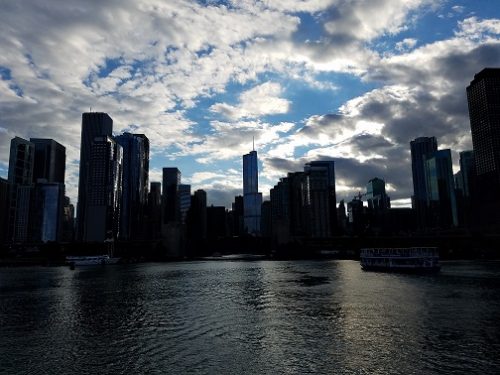
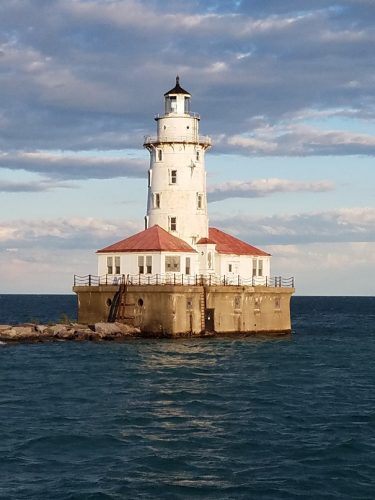
Then to wrap things up I was able to see the closing session with Hillary Clinton. As we were waiting for the program to begin there was a feeling in the room like a rock concert was about to begin. When the background music started playing, We Are Family, the audience was on their feet and singing.
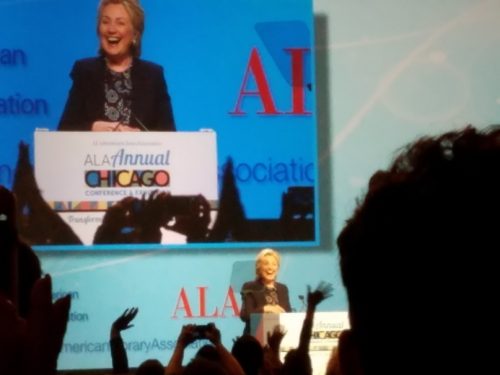
Secretary Clinton asked us to persist and offered three reason we need libraries:
- Reading changes lives. She shared that she’s been taking long walks in the woods, having an occasional glass of Chardonnay, and working her way through the stack of books people have given her with notes like, “This one helped me, I hope it helps you.”
- Libraries are places where communities come together.
- We need critical thinkers who can sort out truth from fiction and make decisions based on rational evidence.
It was a great way to close out the conference and a great visit to a great city.
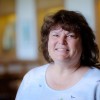
5 Comments on ‘Ellen M. at ALA Annual 2017’
Great report and pictures. The intellectual freedom and open access session sounded great! Wish I could have been there. Thanks for representing me at the Access Services User Group.
“the intersection of library services and the user”.
I like it.
Thank you, Ellen, for this lovely report! You had quite a trip!
Thanks for sharing. Nice skyline pictures (another career change possibility).
Interesting how your open access and your graphic novel threads come together in a maker space. Possibilities are endless!
love your pics!